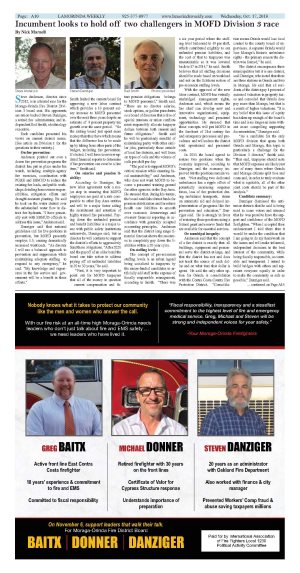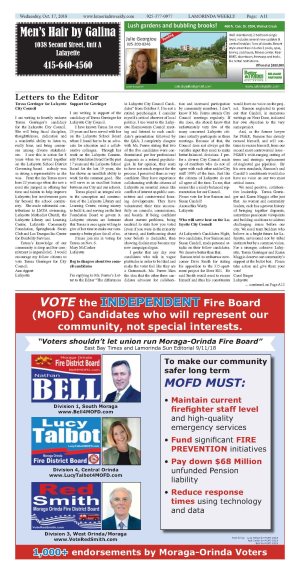| | Published October 17th, 2018
| Incumbent looks to hold off two challengers in MOFD Division 3 race
| | | By Nick Marnell |  | | |
Steve Anderson, director since 2012, is in a heated race for the Moraga-Orinda Fire District Division 3 board seat. His opponents are union-backed Steven Danziger, a retired fire administrator, and independent Red Smith, a technology executive.
 Each candidate presented his views on current district issues. (See article on Division 1 for the questions in their entirety.)
Each candidate presented his views on current district issues. (See article on Division 1 for the questions in their entirety.)
 On fire prevention:
On fire prevention:
 Anderson pointed out over a dozen fire prevention programs the district has put in place under his watch, including multiple-agency fire exercises, coordination with PG&E and EBMUD to reduce the existing fire loads, and public workshops detailing homeowner responsibilities, mitigation efforts and drought-resistant planting. He said he took on the water district over the substandard water flow in district fire hydrants. "I have personally met with EBMUD officials to address this issue," Anderson said.
Anderson pointed out over a dozen fire prevention programs the district has put in place under his watch, including multiple-agency fire exercises, coordination with PG&E and EBMUD to reduce the existing fire loads, and public workshops detailing homeowner responsibilities, mitigation efforts and drought-resistant planting. He said he took on the water district over the substandard water flow in district fire hydrants. "I have personally met with EBMUD officials to address this issue," Anderson said.
 Danziger said that national guidelines call for five positions in prevention, but MOFD presently employs 1.5, causing dramatically increased workloads. "As director I will use a balanced approach to prevention and suppression while maintaining adequate staffing to respond to any emergency," he said. "My knowledge and experience in the fire service and government will be a benefit in these efforts."
Danziger said that national guidelines call for five positions in prevention, but MOFD presently employs 1.5, causing dramatically increased workloads. "As director I will use a balanced approach to prevention and suppression while maintaining adequate staffing to respond to any emergency," he said. "My knowledge and experience in the fire service and government will be a benefit in these efforts."
 Smith faulted the current board for approving a new labor contract which provides a 13 percent salary increase to MOFD personnel over the next three years despite an estimate of 9 percent property tax growth over the same period. "So the exiting board just spent more money than they have which means that the difference has to be made up by taking from other parts of the budget, including fire prevention. If elected, I will have to review updated financial reports to determine if fire prevention can even be a line item," Smith said.
Smith faulted the current board for approving a new labor contract which provides a 13 percent salary increase to MOFD personnel over the next three years despite an estimate of 9 percent property tax growth over the same period. "So the exiting board just spent more money than they have which means that the difference has to be made up by taking from other parts of the budget, including fire prevention. If elected, I will have to review updated financial reports to determine if fire prevention can even be a line item," Smith said.
 On salaries and pension liability:
On salaries and pension liability:
 According to Danziger, the new labor agreement took a major step in ensuring that MOFD employees are paid at a rate comparable to other Bay Area entities and will be a major factor aiding the recruitment and retention of highly trained fire personnel. Paying down the unfunded pension and benefit liabilities is a major issue with public safety institutions nationwide, Danziger said, but as director he will continue to support the district's efforts to aggressively fund those obligations. "After 2020 and the payoff of an older bond the board can take action to address paying off all unfunded liabilities in 20 to 30 years," he said.
According to Danziger, the new labor agreement took a major step in ensuring that MOFD employees are paid at a rate comparable to other Bay Area entities and will be a major factor aiding the recruitment and retention of highly trained fire personnel. Paying down the unfunded pension and benefit liabilities is a major issue with public safety institutions nationwide, Danziger said, but as director he will continue to support the district's efforts to aggressively fund those obligations. "After 2020 and the payoff of an older bond the board can take action to address paying off all unfunded liabilities in 20 to 30 years," he said.
 "First, it is very important to point out for MOFD taxpayers that all of the money in question - current compensation and future pension obligations - belongs to MOFD personnel," Smith said. "There are no director salaries, stock options, or golden parachutes so a board of directors that is free of special interests or union conflicts must responsibly allocate taxpayer dollars between both current and future obligations." Smith said he will be particularly mindful of maintaining parity with other similar jobs, particularly those outside of local fire districts, and will focus on types of calls and the volume of calls per shift per day.
"First, it is very important to point out for MOFD taxpayers that all of the money in question - current compensation and future pension obligations - belongs to MOFD personnel," Smith said. "There are no director salaries, stock options, or golden parachutes so a board of directors that is free of special interests or union conflicts must responsibly allocate taxpayer dollars between both current and future obligations." Smith said he will be particularly mindful of maintaining parity with other similar jobs, particularly those outside of local fire districts, and will focus on types of calls and the volume of calls per shift per day.
 "The goal is to support MOFD's critical mission while ensuring fiscal sustainability," said Anderson, who does not want MOFD to become a personnel training ground for other agencies in the Bay Area. He stressed that, during his tenure, the board established trust funds for pension stabilization and for retiree health care liabilities to smooth over economic downswings and oversaw financial reporting in accordance with generally accepted accounting principles. Anderson said that the district long range financial forecast shows the resources to completely pay down the liabilities within a 20-year cycle.
"The goal is to support MOFD's critical mission while ensuring fiscal sustainability," said Anderson, who does not want MOFD to become a personnel training ground for other agencies in the Bay Area. He stressed that, during his tenure, the board established trust funds for pension stabilization and for retiree health care liabilities to smooth over economic downswings and oversaw financial reporting in accordance with generally accepted accounting principles. Anderson said that the district long range financial forecast shows the resources to completely pay down the liabilities within a 20-year cycle.
 On staffing levels:
On staffing levels:
 The concept of pre-recession staffing levels is an urban legend being socialized to taxpayers by the union-funded candidates to artificially add staff at the expense of fiscally responsible management, according to Smith. "There was a six year period where the staffing level ballooned to 19 per shift, which contributed mightily to our unfunded pension liabilities, and the cost of that to taxpayers was unsustainable so it was lowered back to 17 in 2014," he said. Smith believes that all staffing decisions should be made based on workload and not on the fictitious notion of pre-recession staffing levels.
The concept of pre-recession staffing levels is an urban legend being socialized to taxpayers by the union-funded candidates to artificially add staff at the expense of fiscally responsible management, according to Smith. "There was a six year period where the staffing level ballooned to 19 per shift, which contributed mightily to our unfunded pension liabilities, and the cost of that to taxpayers was unsustainable so it was lowered back to 17 in 2014," he said. Smith believes that all staffing decisions should be made based on workload and not on the fictitious notion of pre-recession staffing levels.
 With the approval of the new labor contract, MOFD has virtually unabridged management rights, Anderson said, which means the fire chief can develop new and innovative organizational, equipment, technology and personnel opportunities. He stressed that these concepts will put MOFD in the forefront of 21st century fire and emergency processes and procedures and will reduce the district total operational and personnel costs.
With the approval of the new labor contract, MOFD has virtually unabridged management rights, Anderson said, which means the fire chief can develop new and innovative organizational, equipment, technology and personnel opportunities. He stressed that these concepts will put MOFD in the forefront of 21st century fire and emergency processes and procedures and will reduce the district total operational and personnel costs.
 In 2013 the board agreed to restore two positions when the economy improved, according to Danziger, and the economy improved but the positions remain vacant. "Not staffing two dedicated ambulances has a ripple effect of potentially increasing response times, loss of fire protection during ambulance transports, strain on automatic aid and delayed implementation of programs like fire prevention and education," Danziger said. He is strongly in favor of restoring those positions using a federal grant and reserve funds that are available for essential services.
In 2013 the board agreed to restore two positions when the economy improved, according to Danziger, and the economy improved but the positions remain vacant. "Not staffing two dedicated ambulances has a ripple effect of potentially increasing response times, loss of fire protection during ambulance transports, strain on automatic aid and delayed implementation of programs like fire prevention and education," Danziger said. He is strongly in favor of restoring those positions using a federal grant and reserve funds that are available for essential services.
 Or municipal inequity:
Or municipal inequity:
 Anderson said that the concept of a fire district is exactly that: all buildings, equipment and personnel serve the district-at-large, and that the district has not and does not track the source of each dollar and on what item that dollar is spent. He said the only other option for Orinda is consolidation with the Contra Costa County Fire Protection District. "Consolidation means Orinda would lose local control to the county board of supervisors. A separate Orinda would lose Moraga's historic ambulance rights - the primary reason the district was formed," he said.
Anderson said that the concept of a fire district is exactly that: all buildings, equipment and personnel serve the district-at-large, and that the district has not and does not track the source of each dollar and on what item that dollar is spent. He said the only other option for Orinda is consolidation with the Contra Costa County Fire Protection District. "Consolidation means Orinda would lose local control to the county board of supervisors. A separate Orinda would lose Moraga's historic ambulance rights - the primary reason the district was formed," he said.
 The district encompasses three municipalities but it is one district, said Danziger, who noted that there are three stations in Orinda and two in Moraga. He said that all residents of the district pay 1 percent of assessed valuation in property taxes and conceded that Orinda does pay more than Moraga, but that is a result of higher valuations. "It is my belief that this issue of equity has taken up enough of the board's time and is no longer an issue without more compelling supporting documentation," Danziger said.
The district encompasses three municipalities but it is one district, said Danziger, who noted that there are three stations in Orinda and two in Moraga. He said that all residents of the district pay 1 percent of assessed valuation in property taxes and conceded that Orinda does pay more than Moraga, but that is a result of higher valuations. "It is my belief that this issue of equity has taken up enough of the board's time and is no longer an issue without more compelling supporting documentation," Danziger said.
 "As a candidate for the only MOFD division that spans both Orinda and Moraga, this topic is particularly a challenge for the Division 3 director," Smith said. "That said, taxpayers should note that MOFD expenses are likely just one of many items where Orinda and Moraga citizens split fees and costs and, in order to truly evaluate what is equitable, all of the other joint costs should be part of the analysis."
"As a candidate for the only MOFD division that spans both Orinda and Moraga, this topic is particularly a challenge for the Division 3 director," Smith said. "That said, taxpayers should note that MOFD expenses are likely just one of many items where Orinda and Moraga citizens split fees and costs and, in order to truly evaluate what is equitable, all of the other joint costs should be part of the analysis."
 Candidate summary:
Candidate summary:
 Danziger dismissed the anti-union rhetoric that he said is being used to scare voters and stressed that he was proud to have the support and confidence of the MOFD firefighters. "When I accepted their endorsement I told them that it would be under the condition that I am going to do my homework on the issues and will make informed, independent decisions in the best interest of the community, while being fiscally responsible, accountable and transparent. I intend to build bridges with others and represent everyone equally in order to make the community as safe as possible," Danziger said.
Danziger dismissed the anti-union rhetoric that he said is being used to scare voters and stressed that he was proud to have the support and confidence of the MOFD firefighters. "When I accepted their endorsement I told them that it would be under the condition that I am going to do my homework on the issues and will make informed, independent decisions in the best interest of the community, while being fiscally responsible, accountable and transparent. I intend to build bridges with others and represent everyone equally in order to make the community as safe as possible," Danziger said.
 Moraga and Orinda citizens and taxpayers should be aware that one of the candidates running for the board is an active firefighter and a member of Local 1230, the same union as MOFD firefighters, Smith said. He called it a massive conflict of interest that an active firefighter in the same union local would oversee his own brotherhood on a governing board. "There will be many issues requiring board vote that will impact union Local 1230, and it is not appropriate for taxpayers to have their elected candidate recuse himself on all labor impacting matters," Smith said.
Moraga and Orinda citizens and taxpayers should be aware that one of the candidates running for the board is an active firefighter and a member of Local 1230, the same union as MOFD firefighters, Smith said. He called it a massive conflict of interest that an active firefighter in the same union local would oversee his own brotherhood on a governing board. "There will be many issues requiring board vote that will impact union Local 1230, and it is not appropriate for taxpayers to have their elected candidate recuse himself on all labor impacting matters," Smith said.
 Every decision Anderson has made in the last six years, he said, he based on three hallmarks: what is best to ensure MOFD can meet its mission of saving lives and property; ensuring MOFD personnel have excellent morale, training and necessary equipment to accomplish that mission; and accomplishing the above within the fiscal constraints of the district. "Fiscal prudence, attention to detail, and cooperative leadership enables a vigorous and time-sensitive MOFD response to Moraga and Orinda's needs for fire protection and emergency medical services," Anderson said. "Results count."
Every decision Anderson has made in the last six years, he said, he based on three hallmarks: what is best to ensure MOFD can meet its mission of saving lives and property; ensuring MOFD personnel have excellent morale, training and necessary equipment to accomplish that mission; and accomplishing the above within the fiscal constraints of the district. "Fiscal prudence, attention to detail, and cooperative leadership enables a vigorous and time-sensitive MOFD response to Moraga and Orinda's needs for fire protection and emergency medical services," Anderson said. "Results count."


|
| | | | | | | | | | | | |




